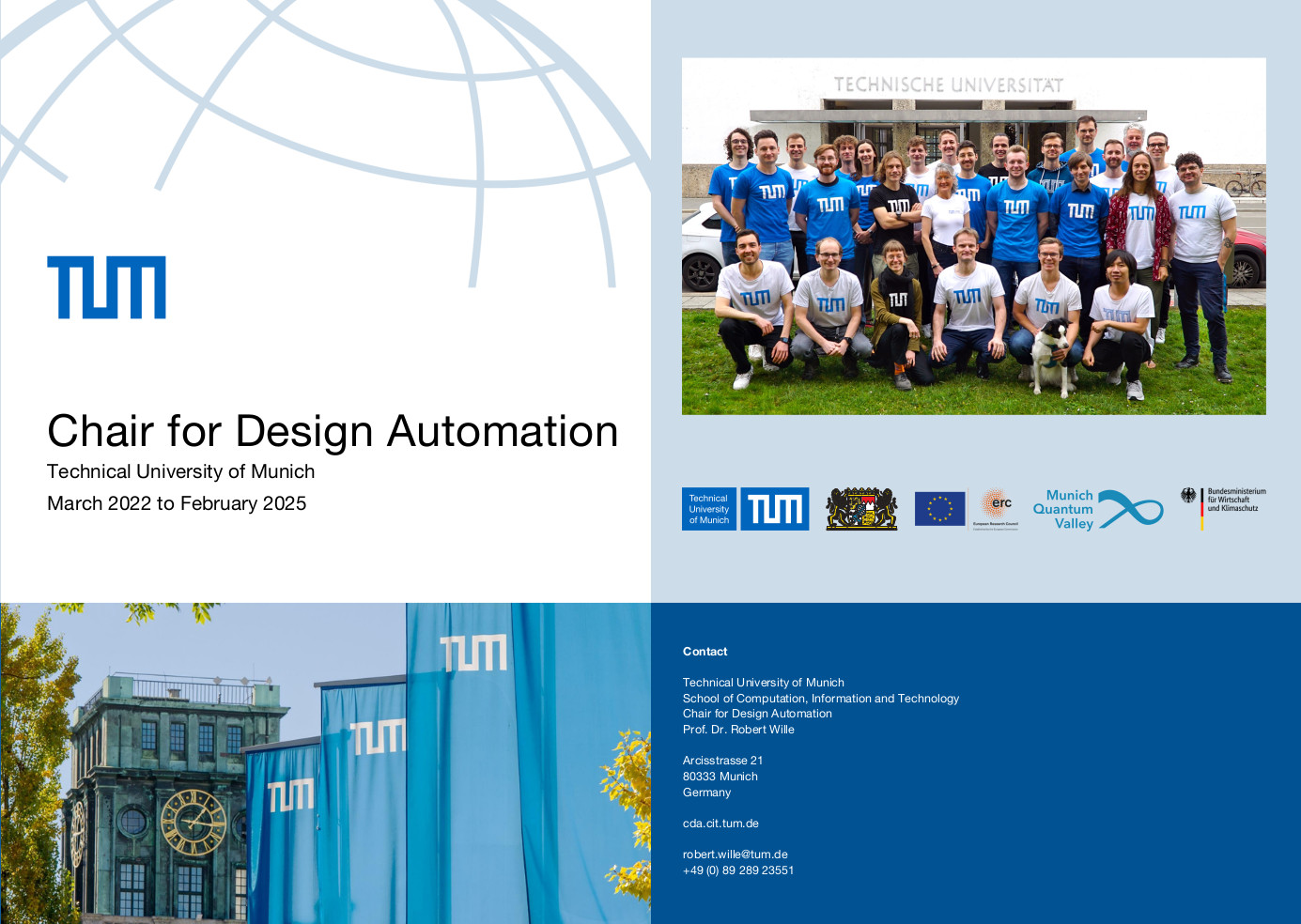
Winter Semester 2024/25
VL Einführung in die Rechnerarchitektur (in German)
| Course ID | Title | Type | Weekly Hours | Teachers | Rhythm |
|---|---|---|---|---|---|
| 240941859 | Einführung in die Rechnerarchitektur (IN0004) | VO | 4 | Martin Schulz | weekly |
Lecturer(s): Martin Schulz, Vincent Bode, Dominic Prinz, Jakob Schäffeler, Robert Wille, Stefan Engels
Content (in German):
In der Vorlesung werden die Grundlagen von Rechnerarchitekturen und Prozessoren vermittelt. Dies beinhaltet insbesondere:
- Rechnersichten
- Assembler
- Aufbau und Funktionsweise: Hardware, Software
- Maschinensprache
- Kodierung von Zeichen und Zahlen
- Prozessoraufbau
- Komponenten des Prozessors
- Pipelining
- Speicherorganisation
- Leistungsbewertung
Die Übung begleitet die Vorlesung durch praktische Aufgaben, welche die jeweiligen Konzepte illustriert.
VI Software for Quantum Computing
| Course ID | Title | Type | Weekly Hours | Teachers | Rhythm |
|---|---|---|---|---|---|
| 677 | Software for Quantum Computing | VI | 3 | Robert Wille | weekly |
Lecturer(s): Robert Wille
Content:
Quantum computers have the potential to solve certain tasks that would take millennia to complete even with the fastest (conventional) supercomputer. Numerous quantum computing applications with a near-term perspective (e.g., for finance, chemistry, machine learning, optimization) and with a long-term perspective (i.e., cryptography, unstructured search) are currently investigated. However, while impressive accomplishments can be observed in the physical realization of quantum computers, the development of automated methods and software tools that provide assistance in the design and realization of applications for those devices is at risk of not being able to keep up with this development anymore. This may lead to a situation where we might have powerful quantum computers but hardly any proper means to actually use them.
This module provides an in-depth introduction into the internals of quantum computing software. This includes
- an elaboration on the differences between classical computing and quantum computing,
- an introduction to the design flow for quantum computing applications,
- a detailed coverage of data-structures and method dedicated to quantum computing,
- a detailed coverage of software tools and methods for important design tasks such as quantum circuit simulation, quantum circuit compilation, quantum circuit verification, etc., as well as
- corresponding hands-on experiences of those tools considering actual quantum algorithms as well as quantum computing platforms.
Machine Learning for Electronic Design Automation and Manufacturing
| Course ID | Title | Type | Weekly Hours | Teachers | Rhythm |
|---|---|---|---|---|---|
| 2226 | Machine Learning for Electronic Design Automation and Manufacturing | VI | 3 | Lorenzo Servadei | weekly |
Lecturer(s): Lorenzo Servadei, Robert Wille
Content:
The complexity of modern chips significantly impacts the cost and capabilities of design and manufacturing for traditional Design Automation Toolkits. This issue is exacerbated by the increased relevance of software and applications running on modern SoCs and their co-design. Current Design Automation methodologies often struggle to fully capture and optimize complicated designs or reduce them to the initial specification. However, advancements in data-driven algorithms, particularly in Machine Learning, can address these shortcomings. This course teaches how to apply Machine Learning to enhance and improve the chip design process.
This module provides an in-depth exploration of machine learning for design automation, including:
- theory and application of machine learning algorithms,
- in-depth exploration of recent machine learning methods suitable for design automation tasks,
- overview of topics, areas, and current industrial pain points in the semiconductor chain where a great availability of data exists,
- detailed coverage of data structures and state-of-the-art tools for tackling design automation, as well as
- hands-on experiences of machine learning algorithms applied to design automation tasks.
Grundlagenpraktikum: Rechnerarchitektur
| Course ID | Title | Type | Weekly Hours | Teachers | Rhythm |
|---|---|---|---|---|---|
| 445 | Rechnerarchitektur (IN0005) | PR | 0 | Martin Schulz | weekly |
Lecturer(s): Anna Mittermair, Damian Rovara, Martin Schulz, Robert Wille
Content:
Over the first half of the course, lecture videos, tutorials, and homework are used to teach fundamental topics in computer architecture, including:
- Introduction to C Programming
- Secure programming
- Debugging tools and optimization strategies
- System Design
- Planning and reading of combinational and sequential circuits
- Realization of circuits using the SystemC library for C++
- Optimization strategies for circuits
- Assembly Language Programming
- Usage of x86 assembly language
- Optimization of C programs
In the second half of the semester, students work on a practical project relating to one of the two branches (System Design and Assembly Language Programming). Projects are implemented in groups of three and finished with a presentation at the end of the semester.
SE Seminar on Topics in Design Automation
| Course ID | Title | Type | Weekly Hours | Teachers | Rhythm |
|---|---|---|---|---|---|
| 3338 | Seminar on Topics in Design Automation | SE | 3 | Robert Wille | weekly |
Lecturer(s): Robert Wille
Content:
In this seminar, current topics from the area of Design Automation are discussed among the participants. A structured
introduction into scientific literature regarding paper reading, literature research, presentation techniques, and
scientific writing is given. The participants are enabled to independently perform all required steps to present a
scientific topic in form of a review paper and an oral presentation.
Note: If you are studying Computer Science, please use this link instead to sign up for this course.



